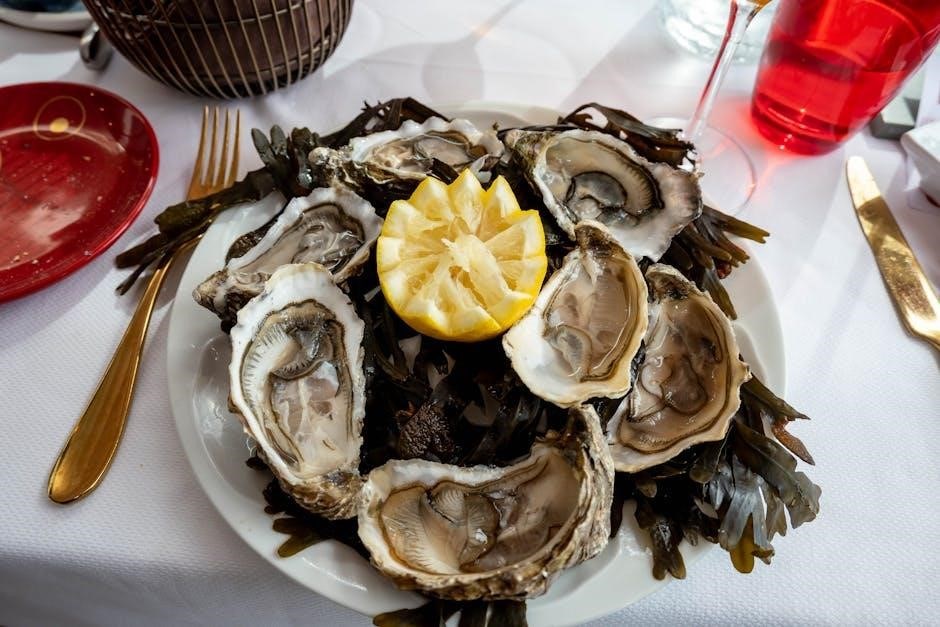“In Defence of Food” by Michael Pollan is a compelling critique of modern eating habits, advocating for a return to whole, nutrient-rich foods. It challenges the dominance of processed foods and the Western diet, offering a simple yet profound guideline: “Eat food.” This book serves as a manifesto for mindful eating, encouraging readers to reconnect with the cultural and historical significance of food.
Overview of the Book and Its Importance
“In Defence of Food” critiques modern dietary trends, emphasizing the shift from processed foods to whole, nutrient-rich foods. Pollan argues that the Western diet has led to health crises, urging readers to rethink their food choices. The book is a cultural and historical exploration of food, advocating for mindful eating and a return to traditional dietary practices. Its importance lies in its ability to simplify complex nutritional debates, offering a clear and accessible guide to healthier living.
Michael Pollan: Author and Food Advocate
Michael Pollan, a renowned author and food advocate, has significantly influenced contemporary food culture. His works, including The Omnivore’s Dilemma and Food Rules, challenge modern dietary norms, promoting a return to whole, nutrient-rich foods and mindful eating practices. Pollan’s advocacy for sustainable food systems and his critique of industrial agriculture have made him a leading voice in the movement toward healthier and more ethical eating habits.
Background and Contributions to Food Literature
Michael Pollan, a celebrated author and professor, has profoundly shaped food literature with works like The Omnivore’s Dilemma and Food Rules. His writing critiques industrial agriculture and advocates for sustainable, whole foods. Pollan’s research and advocacy have influenced public perception and policy, earning him widespread acclaim. His ability to bridge science, culture, and everyday eating has made his work accessible and impactful, solidifying his role as a leading voice in the food movement.
The Core Argument of “In Defence of Food”
Michael Pollan’s In Defence of Food critiques the Western diet’s reliance on processed foods, advocating a return to traditional, nutrient-rich whole foods for better health and well-being.
Eat Food: Redefining Food in the Modern Era
Michael Pollan challenges the modern notion of “food” by distinguishing it from processed products dominating grocery aisles. He argues that true food is whole, unrefined, and minimally altered, emphasizing its cultural and nutritional value. Pollan critiques the prevalence of “edible food-like substances” and urges consumers to prioritize real food, highlighting its benefits for health and satisfaction. This redefinition encourages a shift from industrial products to natural, traditionally prepared meals, aligning with ancestral diets that foster well-being.
The Western Diet and Its Impact on Health
The Western diet, dominated by processed foods, refined sugars, and unhealthy fats, has been linked to rising rates of chronic diseases like obesity, diabetes, and heart disease. Pollan highlights how this diet, characterized by nutrient-poor and calorie-dense foods, deviates from traditional diets that emphasize whole, nutrient-rich foods. This shift has led to widespread health deterioration, underscoring the need for a return to eating real, unprocessed foods to reclaim our health and well-being.

The Structure of the Book
“In Defence of Food” is structured in three parts: examining nutritionism’s rise, presenting Pollan’s food manifesto, and offering practical eating guidelines, ensuring a clear, logical flow.
Chapter Breakdown and Key Themes
The book is divided into three parts, each addressing a unique aspect of food and nutrition. The first part critiques the science behind nutritionism, while the second presents Pollan’s simple food manifesto. The final section offers practical advice for making healthier dietary choices. Each chapter builds on the previous one, creating a cohesive narrative that challenges conventional wisdom and encourages a return to whole, unprocessed foods. This structure ensures a clear, engaging journey toward mindful eating and better health outcomes.
Chapter 15 delves into Pollan’s central argument: redefining food in a world dominated by processed products. He distinguishes between “real food” and “edible food-like substances,” emphasizing that whole, unprocessed foods are essential for health. Pollan advocates for returning to traditional foods, highlighting their cultural and nutritional significance. He provides practical advice, such as avoiding products with lengthy ingredient lists or health claims. This chapter serves as a guide to identifying and embracing authentic, nourishing food in a confusing marketplace.
The Science Behind the Book
The book explores the nutritional science behind whole foods, critiquing modern diets and promoting a return to natural, unprocessed ingredients for better health outcomes.
Nutrition and the Role of Whole Foods
Whole foods are central to Pollan’s argument, offering essential vitamins, minerals, and nutrients in balanced forms. Unlike processed foods, they provide fiber, antioxidants, and natural enzymes that support digestion and overall health. By focusing on unrefined, unprocessed ingredients, individuals can reduce the risk of chronic diseases like heart disease, diabetes, and obesity. Pollan emphasizes that whole foods promote a healthier relationship with eating, aligning with how humans have thrived for centuries. This approach rejects the fragmented view of nutrition dominated by isolated nutrients.

The Influence of the Food Industry on Diets
The food industry significantly shapes dietary habits through aggressive marketing and lobbying. By promoting processed foods as convenient and affordable, corporations manipulate consumer preferences. Pollan argues that the industry’s influence distorts nutritional science, leading to conflicting dietary guidelines. This manipulation fosters a culture of overconsumption and unhealthy choices. The industry’s profit-driven strategies often prioritize market share over public health, contributing to widespread dietary imbalances and chronic diseases. This undue influence undermines efforts to adopt healthier, more sustainable eating practices.

Challenges to Conventional Wisdom
Michael Pollan challenges conventional dietary wisdom by questioning the effectiveness of modern nutrition science and the failures of diet culture, advocating for a simpler, whole-food approach.
Critique of Nutritionism and Its Effects

Pollan critiques nutritionism, the belief that food can be reduced to its nutrient parts, arguing it oversimplifies eating and leads to unhealthy choices. By focusing on individual nutrients rather than whole foods, people are misled into consuming processed products marketed as “healthy.” This approach has fueled diet fads, confusion, and poor health outcomes, highlighting the need for a simpler, more holistic understanding of food and nutrition.
The Failure of Diet Culture
Diet culture has failed by promoting quick fixes and unrealistic standards, often leading to a cycle of restriction and overconsumption. Pollan argues that the focus on individual nutrients rather than whole foods has fueled this failure. Diets based on willpower ignore the emotional and cultural significance of eating, leading to dissatisfaction and poor health outcomes like obesity and chronic diseases. This approach neglects the importance of enjoying food, highlighting the need for a more balanced and sustainable relationship with eating.

Real-World Applications of Pollan’s Principles
Pollan’s principles emphasize cooking whole meals, avoiding processed foods, and mindful eating. These practices promote healthier habits and a deeper connection to food and culture.
Practical Tips for Healthy Eating

Pollan offers simple yet impactful advice: focus on whole, unprocessed foods, and avoid products with long ingredient lists. Cook meals from scratch using fresh ingredients, and prioritize quality over quantity. Incorporate a variety of seasonal foods to ensure a balanced diet. Limit snacks and eat mindfully, savoring each bite. Avoid eating in front of screens and engage in communal meals to foster a healthier relationship with food and culture.
Shifting from Processed to Whole Foods
To transition from processed to whole foods, start by identifying and eliminating highly processed items in your diet. Replace them with nutrient-dense alternatives like fruits, vegetables, whole grains, and lean proteins. Plan meals around seasonal, locally sourced ingredients to ensure freshness and variety. Gradually reduce reliance on packaged foods by preparing homemade versions of staples like bread, yogurt, and snacks. This shift not only enhances nutrition but also fosters a deeper connection to the food we eat.

Cultural and Historical Significance of Food
Food embodies cultural identity, reflecting traditions, values, and history. It unites communities, preserving heritage through shared meals and recipes, highlighting its profound role beyond sustenance.
Food as a Cultural and Historical Element
Food serves as a profound reflection of cultural identity and historical heritage, shaping traditions and communal bonds. It preserves memories, rituals, and values passed through generations, fostering a sense of belonging. Pollan highlights how cuisine embodies the soul of cultures, with recipes and ingredients telling stories of ancestry and migration. This cultural significance transcends nutrition, linking food to art, religion, and social unity, while also addressing how modern diets disrupt these timeless connections, urging a return to mindful, culturally rooted eating practices.
The Role of Food in Society
Food plays a vital role in society, extending beyond individual nutrition to shape social dynamics and cultural identities. It fosters community through shared meals and traditions, reinforcing bonds and collective well-being. Additionally, food influences economic systems, with agriculture and food production impacting livelihoods and policies. Pollan emphasizes the importance of recognizing food’s societal role, advocating for systems that prioritize health, sustainability, and equity, thereby promoting a healthier relationship between food, culture, and the environment.
Pollan’s In Defence of Food offers a compelling critique of modern diets, urging a return to whole foods and mindful eating for better health and sustainability.
Recap of Key Messages
Pollan’s In Defence of Food emphasizes returning to whole, unprocessed foods to combat chronic diseases linked to the Western diet. He critiques nutritionism for oversimplifying food science, promoting a focus on nutrients over actual meals. The book advocates for mindful eating, rejecting diet culture, and understanding food as a cultural and ecological connection. By prioritizing quality over quantity, Pollan encourages readers to adopt a simpler, healthier relationship with food, aligning with traditional dietary wisdom rather than modern fads.
Encouragement to Adopt Mindful Eating

Pollan urges readers to embrace mindful eating, savoring meals and paying attention to hunger cues; This approach fosters a healthier relationship with food, reducing overconsumption and promoting satisfaction. By slowing down and enjoying whole, nutrient-dense foods, individuals can break free from diet culture and nurture a deeper appreciation for the cultural and ecological significance of eating. Mindful eating becomes a transformative practice, enriching both health and the joy of eating.
FAQ and Common Questions
Q: What is the central argument of “In Defence of Food”?
A: Pollan argues for returning to whole foods and rejecting processed “edible food-like substances” to restore health and vitality.
Q: Is the book suitable for all diets?
A: While Pollan emphasizes whole foods, he respects cultural and dietary diversity, making the book relevant to various eating preferences.
Q: Does Pollan provide practical eating tips?
A: Yes, he offers simple guidelines like “Eat food. Not too much. Mostly plants,” to help readers make healthier choices.
Addressing Reader Queries
Q: What inspired Pollan to write “In Defence of Food”?
A: Pollan aimed to challenge the dominance of processed foods and nutritionism, advocating for a return to traditional eating habits.
Q: Is “In Defence of Food” scientifically backed?
A: Yes, Pollan draws on extensive research to critique modern dietary practices and promote whole foods for better health outcomes.
Q: How does Pollan define “real food”?
A: He refers to minimally processed, naturally occurring foods like fruits, vegetables, and whole grains, emphasizing their superiority over industrial products.
Q: Can the book help with weight loss?
A: While not a diet book, Pollan’s focus on whole foods and mindful eating can support healthier habits and weight management.
Clarifying Misconceptions About the Book
Some readers assume In Defence of Food is anti-science or a diet book, but it’s neither. Pollan critiques nutritionism, not science itself, and offers no quick fixes. He argues for a return to traditional eating, not restrictive dieting. The book isn’t anti-technology but warns against over-reliance on processed foods. It’s a call for mindful, culturally informed eating rather than a simplistic solution to health issues.
Resources and Further Reading
In Defence of Food isn’t anti-science but critiques nutritionism’s reductionism, advocating for whole foods over processed ones without promoting fad diets or quick fixes.
Available Platforms for Download
In Defence of Food is widely available in digital formats. The PDF version can be downloaded from major ebook platforms like Amazon Kindle, Google Play Books, and Apple Books. Many online retailers also offer the book in EPUB and MOBI formats. Additionally, libraries often provide digital loans for the title. Ensure to purchase from authorized sellers to support the author and publisher. For physical copies, consider local bookstores or online retailers like Barnes & Noble or IndieBound.
Additional Materials and References
For a deeper understanding of In Defence of Food, explore Michael Pollan’s interviews, lectures, and articles. Companion guides, such as discussion questions and study aids, are available online. Related books like The Omnivore’s Dilemma offer complementary insights. Check out online resources, including food blogs and academic papers, that expand on Pollan’s ideas. Many universities and libraries provide access to these materials, enriching your exploration of food culture and nutrition.

Call to Action
Join the movement by embracing whole foods and mindful eating. Share Pollan’s insights to inspire healthier choices in your community.
Encouraging Readers to Engage
Transform your relationship with food by embracing Pollan’s wisdom. Read the “In Defence of Food” PDF to gain insights into healthier, mindful eating. Share the book with friends and family to inspire positive change. Discuss its principles in community groups or online forums to foster a deeper understanding of nutrition. Apply Pollan’s guidance to your daily meals and encourage others to do the same. Together, we can create a culture that values whole foods and promotes well-being for all.
Importance of Spreading the Message
Sharing the insights from “In Defence of Food” PDF is crucial for fostering a healthier society. By spreading Pollan’s message, you inspire others to adopt mindful eating habits and prioritize whole foods. This collective shift can lead to reduced chronic diseases and a stronger connection to our food systems. Encourage others to read the book and join the movement toward a healthier, more sustainable food culture. Together, we can create meaningful change and improve overall well-being.
